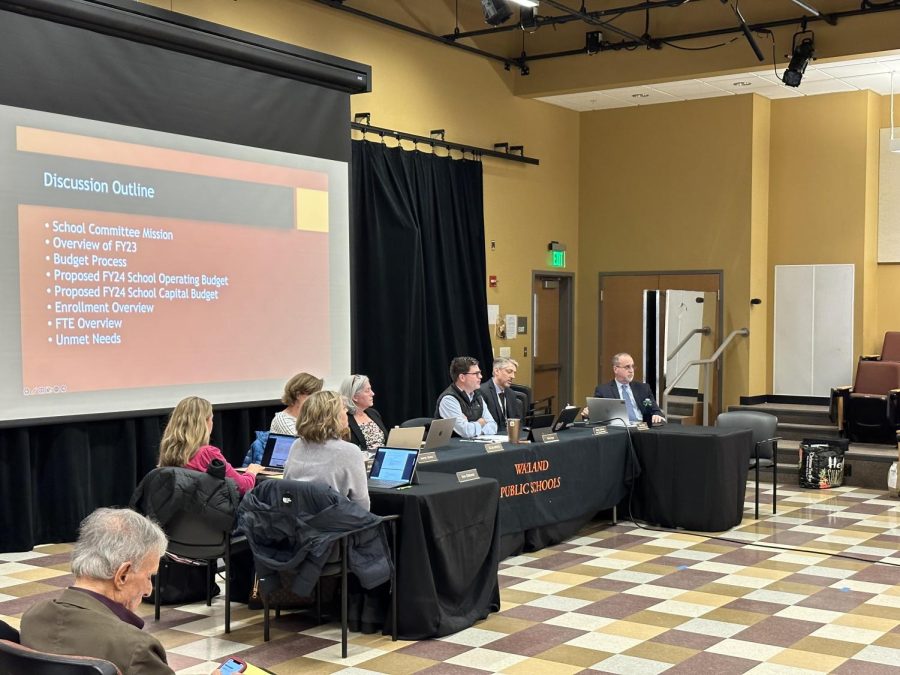School Committee discusses Wayland’s FY24 budget
Credit: Katya Luzarraga
On Monday, March 13, and Wednesday, March 15, the Wayland School Committee met to discuss the budget for FY24, opening up time for public comment at the end of each meeting.
March 17, 2023
On Monday, March 13 and Wednesday, March 15, the Wayland School Committee held public meetings to discuss the Wayland Public School budget for the Fiscal Year 2024 (FY24), which will span from April 1, 2023 to March 31, 2024. The meeting highlighted budget cuts that include removing a proposed move to full-day kindergarten, removing a proposed special education (SpEd) teacher at Loker School and reducing the budget for out-of-district tuition and transportation.
The Director of Finance and Operations, Tom Lafleur, began the meeting by sharing a presentation that went over key areas from the FY23 budget, as well as the budget for FY24 and FY25. As of Jan. 24, the School Committee’s budget was $48,803,195 after reductions to Superintendent Omar Easy’s Dec. 14, 2022 recommended budget of $50,001,482.
The FY24 budget evolution is listed below with details on which positions and areas will be reduced for FY24.
SpEd general expenses:
There is a certain amount of money allotted to out-of-district tuition and out-of-district transportation. The state of Massachusetts reimburses $300,000 for out-of-district tuition. If there is money left from the reimbursement, this money goes towards reimbursing the town for out-of-district transportation.
“[The School Committee] budgeted with the assumption that we were not going to get money back from the state to reimburse us for out-of-district transportation,” interim Superintendent Parry Graham said. “Out of the $450,000 budgeted, $300,000 may come back or may not come back, but the cost exists whether it gets reimbursed by the state or not.”
The FY23 appropriation was $47,164,770, but due to a significant increase in SpEd out-of-district placements and associated transportation after the FY23 appropriation budget was set, the FY24 budget for SpEd expenses is 48% over FY23 budget. This means that in the FY24 budget, there was a $1.7 million increase from FY23.
The increased expense for FY23 was covered largely by the SpEd prepay and circuit breaker funds. For FY24, there is no SpEd prepay or circuit breaker funds remaining in the town’s budget to cover the SpEd out-of-district transportation costs.
During FY24, the SpEd transportation budget is undergoing a reduction of $450,000. This budget could potentially receive a $150,000 town meeting appropriation to a SpEd Reserve Fund. This $150,000 appropriation would come from the town’s money, and it would help offset future costs that would affect SpEd out-of-district transportation.
“[A SpEd Reserve Fund] is something that the School Committee has talked about for the past few years, some sort of a reserve fund,” School Committee Chair Chris Ryan said. “It’s a really great tool to help us manage costs that need to be taken care of, and you don’t always know when [unexpected costs will occur], so this reserve fund is a really great tool.”
Wayland Middle School staff increase:
The School Committee made a reduction of $144,000 for some proposed WMS staff increases. These reductions would be coming out of increases in WMS staff pay, as these staff members move up through their positions.
Graham also highlighted that no current WMS staff are being affected by the budget, and that the reduction in staff increases are being factored into the current budget for WMS. No teacher is being cut from any positions, and any WMS teachers who are retiring or taking a sabbatical are doing so of their own volition.
“Again, the School Committee’s objective, as well as my objective, is to try to protect existing personnel,” Graham said. “In this budget, we are not cutting [staff] as a result of those budget cuts.”
Loker School SpEd teachers:
Since the inclusion of the Spanish immersion program at Loker Elementary School, the student population has seen a significant increase. With this increase, parents are concerned about the number of SpEd teachers that are currently working in the Spanish immersion program, and how this SpEd teacher reduction will affect the Spanish immersion program.
“This SpEd position is currently being serviced by 0.7 of a person, which is crazy to think about,” Wayland parent and Loker School PTO Secretary Courtney Conery said. “That’s five full classrooms with not even a full-time SpEd teacher. This is horrible because this SpEd teacher is a very specialized person.”
The School Committee voted to reduce $75,000 for the proposed Loker School SpEd teacher.
“The ELL teacher and Loker SpEd teacher were enrollment driven, new positions,” Ryan said. “After talking to the School Committee and the administrators, the feeling was that it’s better to have a reduction of [these newer positions] than to have a reduction of educators who were already working in the district.”
In addition to the reduction of a Loker SpEd teacher, Spanish immersion teaching assistants (TAs) were an unmet need from FY22 for the district. Adding Spanish immersion program TAs would cost $50,000. The School Committee deferred this need to FY24.
“At the moment, what we’re looking at is to meet the cost requirements, we are not cutting positions, but we are not able to increase SpEd management,” Graham said. “I’m cautious to speculate what that will look like, but we have an obligation to provide those services, so we’re going to do that.”
Full-day kindergarten:
The issue of full-day kindergarten was introduced to the School Committee in 2019, but the School Committee has still not approved of enacting full-day kindergarten. Since FY20, full-day kindergarten has been deferred, and it’s now set to be discussed by the School Committee in FY24. Full-day kindergarten at all three Wayland elementary schools would add up to $457,772, which the School Committee has voted to take out of FY24’s budget.
Keeping full-day kindergarten would mean that the School Committee would need to account for paying staff who are full-time equivalents (FTEs). Most Wayland full-day kindergarten employees have 40-hour workweeks, meaning that these employees are 1.0 FTEs. During FY23 and prior years, 65% of the 1.0 FTE, meaning nine teachers and nine TA’s, have been included in the operating budget.
The School Committee also discussed alternative ways to get full-day kindergarten approved in the School Committee budget. One of these ways is to phase into full-day kindergarten, with a multi-year plan. If this multi-year plan was adopted by the School Committee, after four years, the School Committee would not have to associate full-day kindergarten as a large hit to the fiscal year budget.
“A phased approach to [full-day kindergarten], whether it’s a three-year or a five-year approach, would essentially over time reduce that $2,700 fee that parents need to pay by a quarter each year,” Graham said. “After four years, there is no cost associated with it, but it’s only a quarter of the cost each year in the [school’s] budget.”


























